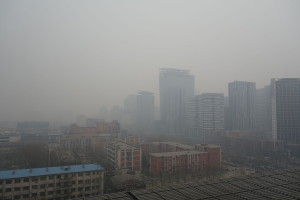China Vows Crackdown on Pollution, Despite Censoring Environmental Documentary
On March 9, 2015, Chinese President Xi Jinping vowed to crack down on polluters that are contributing to the continuing smog problem in major cities. Addressing an audience while reviewing the work report of the State Council together with the National People’s Congress deputies from Jiangxi Province, Xi reiterated the central government’s determination to reduce pollution.

However, despite the declaration of a “war on pollution” last year, this announcement comes on the heels of government censorship of the viral film “Under the Dome,” which examines the roots of China’s smog problem. Since the film ultimately rests the blame on the lack of government action, the decision to ban it belies the magnitude of the dilemma that pollution poses to the central government. The government recognizes the dangers of environmental degradation, but cannot take the necessary radical steps against the problem without derailing China’s stability-inducing high GDP growth rate.
Xi’s declaration demonstrates how environmental issues have found their way into the national discourse regarding the country’s future. At this conference, Xi remarked how he would “punish, with an iron hand, any violators who destroy the ecology or environment, with no exceptions.” His announcement illustrates the problems that threaten both China’s economy and its people, such as polluted fresh water supplies, severe droughts, and desertification. One of the most prominent problems is the heavy smog that frequently envelops its larger cities. A recent term that has skyrocketed in awareness in China is PM 2.5 density, which measures the concentration of airborne particles in the air that are less than 2.5 microns in diameter. These particles can permeate the lungs and cause numerous respiratory problems. An increasing number of urban residents are familiarizing themselves with the PM 2.5 density and its ramifications on their lives, especially the rising number of young professionals in major cities like Beijing and Shanghai that use Chinese social media. Thus Xi’s announcement demonstrates that the government has placed this issue as one of its top priorities.
Although efforts are being made to reduce smog around major cities, many experts insist that the government must invest even more energy into tackling this problem. Beijing, one of the most notoriously smog-inflicted cities, initiated a 5-year plan in 2013 to reduce the PM 2.5 density by 20% by 2017. This plan includes various measures, such as forbidding the use of coal in certain areas, engaging with the community, and investing more than 10 billion RMB (~1.5 billion dollars) into reducing smog around the city. Despite these advances, issues with government oversight still remain, as demonstrated in the comment of scholar Qin Dahe with the Chinese Academy of Sciences: “Problems such as administration loopholes, weak public awareness and lack of supervision still exist.” This claim demonstrates that the people recognize that implementing new technologies must be paired with strong political will to enforce environmental regulations. Perhaps Xi’s announcement was meant to signal increased government willingness to forcefully address the problem of enforcement.
However, this commitment fails to achieve its desired impact when considering the recent censorship of the Chinese environmental documentary, Under the Dome. In this film, former CCTV investigative journalist Chai Jing identifies China’s reliance on its coal and steel production industries, as well as the powerless government department responsible for environmental issues, as the main sources of China’s smog problem. Yet hidden underneath her message was a veiled critique of the central government, as each problem stems from the lack of resolve to punish offenders and strengthen regulation. She even criticized the historic climate change deal inked by China and the U.S. in November 2014, saying that China’s pledge to cap carbon intensity by 2030 means that its pollution will keep growing until then, despite the current deplorable situation.
Released on February 28, this video reached 200 million views within 48 hours before it was removed from all Chinese media sites on March 7. Evidently, the central government hopes to solve China’s environmental problems through technical solutions instead of reforming the structure of its economy by replacing jobs in the coal and steel industries with those in cleaner energies such as oil and renewables. In other words, the government plans to tackle the symptoms of pollution by implementing technical improvements at a methodical pace instead of addressing the root causes of the problem. Unfortunately, time is not a luxury that China can afford with its deteriorating environmental situation.
The environmental problems that China faces have forced Xi into a nearly intractable situation. Although he has repeatedly affirmed the commitment of the central government to addressing pollution, particularly smog, its actions will only have temporary benefits at best. As Chai Jing explained through her now censored documentary, the source of smog stems from the very industries that China relies on to drive its growth in the short term. Placing additional regulations on these industries, let alone abandoning them altogether, would send a negative shock through China’s economy, which is still adjusting to a slowdown in annual growth. As such, Xi must balance meaningful responses to environmental threats with the maintenance of both the Chinese economy and a credible image of the central government. His actions may not seem enough, but they thus far lie within the realistic boundaries that Xi can achieve without disrupting China’s economic growth. However, if Xi can adapt his current crackdown on corruption within the Communist Party to punish those who take advantage of legal loopholes to emit excessive pollution, perhaps it can be the first step to building political will to tackle pollution’s root causes.
